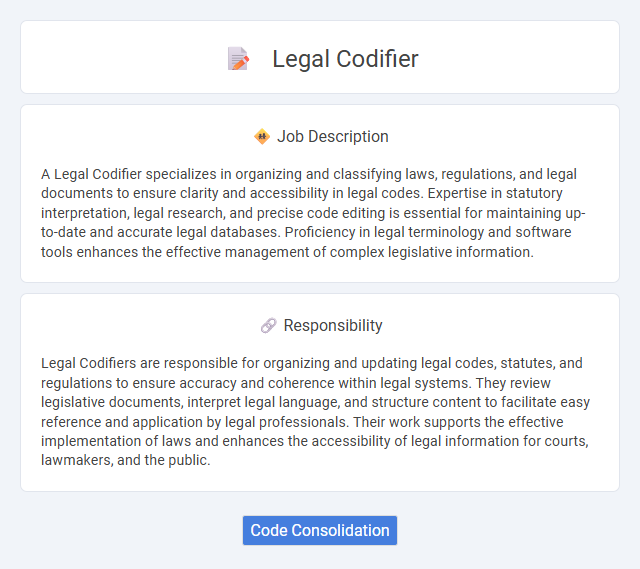
A Legal Codifier specializes in organizing and classifying laws, regulations, and legal documents to ensure clarity and accessibility in legal codes. Expertise in statutory interpretation, legal research, and precise code editing is essential for maintaining up-to-date and accurate legal databases. Proficiency in legal terminology and software tools enhances the effective management of complex legislative information.
Individuals with strong analytical skills and attention to detail are likely suitable for a Legal Codifier role, as the job involves organizing and classifying legal information accurately. Those who prefer structured, methodical work environments may find this position aligns with their strengths, while candidates lacking patience for repetitive tasks could face challenges. A background or interest in law and legal terminology probably increases the chances of success in this field.
Qualification
Legal Codifiers require a strong foundation in law, typically demonstrated by a bachelor's degree in legal studies, paralegal studies, or a related field. Proficiency in legal research, attention to detail, and familiarity with legal terminology and documentation standards are essential qualifications. Experience with legal databases, coding systems, and software such as LexisNexis or Westlaw enhances a candidate's effectiveness in accurately organizing and indexing statutes, regulations, and case law.
Responsibility
Legal Codifiers are responsible for organizing and updating legal codes, statutes, and regulations to ensure accuracy and coherence within legal systems. They review legislative documents, interpret legal language, and structure content to facilitate easy reference and application by legal professionals. Their work supports the effective implementation of laws and enhances the accessibility of legal information for courts, lawmakers, and the public.
Benefit
The role of a Legal Codifier likely offers significant benefits including enhanced expertise in organizing and maintaining legal statutes, which can improve legal compliance and accessibility. This position may provide opportunities for professional growth through detailed analysis and structured documentation of laws. Employing a Legal Codifier could potentially lead to increased efficiency in legal research and better support for legislative bodies.
Challenge
A Legal Codifier likely encounters the challenge of interpreting complex statutes and regulations with precision to ensure accurate categorization and indexing. The probability of facing ambiguous or outdated legal language increases the difficulty of maintaining up-to-date and compliant legal codes. Navigating these intricacies requires strong analytical skills and attention to detail to minimize errors that could impact legal research and practice.
Career Advancement
Legal Codifiers play a crucial role in organizing and updating statutes, which builds a foundation for career growth in law and legislative fields. Expertise in legal research, statutory analysis, and code maintenance increases opportunities for advancement into senior roles such as legislative analyst, legal consultant, or policy advisor. Mastery of digital tools for document management and compliance tracking further enhances progression prospects within government agencies and private law firms.
Key Terms
Code Consolidation
Legal Codifiers specialize in code consolidation by systematically reviewing and integrating statutes, regulations, and legal texts to create coherent, updated legal codes. They ensure consistency and eliminate redundancies by cross-referencing and merging overlapping provisions while preserving legislative intent. Expertise in legal research, statutory interpretation, and advanced document management tools is essential to maintain the accuracy and accessibility of consolidated legal codes.
 kuljobs.com
kuljobs.com